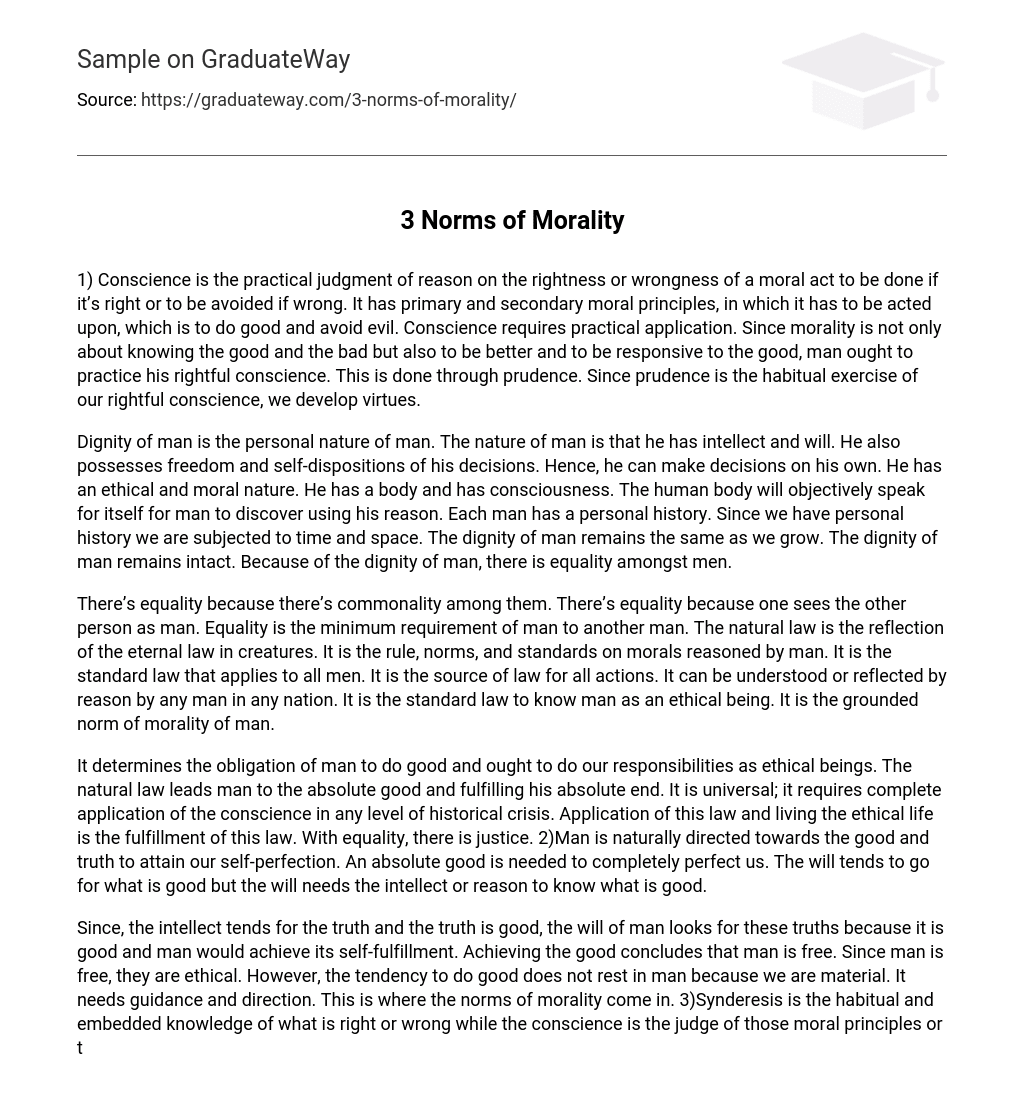1) Conscience is the practical judgment of reason on the rightness or wrongness of a moral act to be done if it’s right or to be avoided if wrong. It has primary and secondary moral principles, in which it has to be acted upon, which is to do good and avoid evil. Conscience requires practical application. Since morality is not only about knowing the good and the bad but also to be better and to be responsive to the good, man ought to practice his rightful conscience. This is done through prudence. Since prudence is the habitual exercise of our rightful conscience, we develop virtues.
Dignity of man is the personal nature of man. The nature of man is that he has intellect and will. He also possesses freedom and self-dispositions of his decisions. Hence, he can make decisions on his own. He has an ethical and moral nature. He has a body and has consciousness. The human body will objectively speak for itself for man to discover using his reason. Each man has a personal history. Since we have personal history we are subjected to time and space. The dignity of man remains the same as we grow. The dignity of man remains intact. Because of the dignity of man, there is equality amongst men.
There’s equality because there’s commonality among them. There’s equality because one sees the other person as man. Equality is the minimum requirement of man to another man. The natural law is the reflection of the eternal law in creatures. It is the rule, norms, and standards on morals reasoned by man. It is the standard law that applies to all men. It is the source of law for all actions. It can be understood or reflected by reason by any man in any nation. It is the standard law to know man as an ethical being. It is the grounded norm of morality of man.
It determines the obligation of man to do good and ought to do our responsibilities as ethical beings. The natural law leads man to the absolute good and fulfilling his absolute end. It is universal; it requires complete application of the conscience in any level of historical crisis. Application of this law and living the ethical life is the fulfillment of this law. With equality, there is justice. 2)Man is naturally directed towards the good and truth to attain our self-perfection. An absolute good is needed to completely perfect us. The will tends to go for what is good but the will needs the intellect or reason to know what is good.
Since, the intellect tends for the truth and the truth is good, the will of man looks for these truths because it is good and man would achieve its self-fulfillment. Achieving the good concludes that man is free. Since man is free, they are ethical. However, the tendency to do good does not rest in man because we are material. It needs guidance and direction. This is where the norms of morality come in. 3)Synderesis is the habitual and embedded knowledge of what is right or wrong while the conscience is the judge of those moral principles or the act of reason.
Synderesis is speculative notion of moral principles while the conscience is the judge of the practical act of those moral principles. Synderesis does not necessarily involve any action in the circumstance while the conscience involves action because it judges the act done or to be done. 4) Conscience in crisis is a momentous event in which, one’s premises about morality are different from the outside world. The man starts to question his conscience and morality based on the circumstance that he is currently experiencing. It is in this crisis that the conscience starts to doubt the norms of morality.
That individual would be reckless and restless because he wants to achieve the good and know the truth on what to do and not to do. In order to overcome this crisis, one must reflect on his conscience. Since the conscience is a derivation of process, one ought to discern the circumstance step by step slowly. However, this is not an easy task. If the conscience is in doubt, don’t do any act. Man ought to be prudent, he ought to step back and reflect on the circumstance. One must be prudent because he is perhaps ignorant on the circumstance at hand or his knowledge is inadequate.





